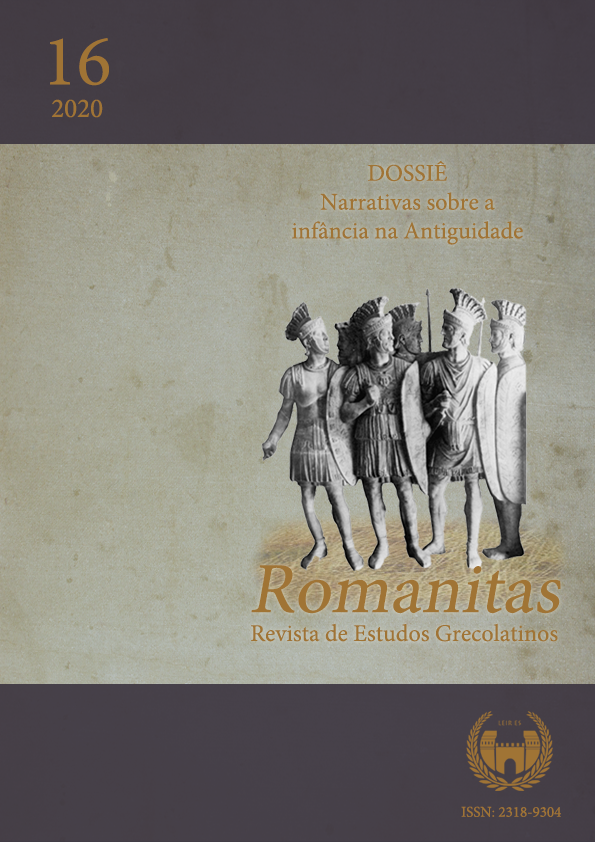The childhood in the Homeric poems
DOI:
https://doi.org/10.17648/rom.v0i16.33120Keywords:
Homer, Iliad, Odyssey, Childhood, AedosAbstract
As the first European literary documents, the Iliad and the Odyssey ensure in the cultural history of the West a unique status: assuming itself since Antiquity as the first foundation of philological and philosophical research, and superior literary and artistic model, and today tended to be interpreted in the framework of slow creative elaboration of generations of aedos, based on a peculiar technique of production and transmission, both articulate in an enigmatic poetic plot, from their traditional nature, threads of mythic narratives and historical realities that modern archaeological investigations confirm. Starting from the poetic pretext offered by the two works, we propose to trace references to the universe of childhood. Some, generic, occur as images of a certain extract from human society, marked by peculiar characteristics, functions and needs. Others, supported by specific mentions of determined children, assume a specific dramatic functionality in the mythical plot of the two poems, which contributes to the peculiar symbolic density of the narrative.
Downloads
References
Documentação textual
HOMERO. Ilíada. Tradução e Introdução de Frederico Lourenço. Lisboa: Cotovia, 2005.
HOMERO. Odisseia. Tradução, notas e comentários de Frederico Lourenço. Lisboa: Cotovia, 2018.
HEUBECK, A.; WEST, S. (ed.). Odissea. Milano: Fondazione Lorenzo Valla/Arnoldo Mondadori, 1981-1986.
KIRK, G. S. (ed.). The Iliad: a commentary. Cambridge: Cambridge University Press, 1985. v. 6.
Obras de apoio
BOWRA, C. M. Tradition and design in the Iliad. Oxford: Clarendon Press, 1968.
COOK, A. Visual aspects of the Homeric simile in Indo-European context. Quaderni Urbinati di Cultura Classica, n. 17, p. 39-59, 1984.
DUNBAR, H. A complete concordance to the Odyssey of Homer. Oxford: Clarendon Press, 1880-1983.
DUNBAR, H. A complete concordance to the Odyssey of Homer. Oxford: Clarendon Press, 1880-1962.
FINLEY, M O mundo de Ulisses. Lisboa: Edições 70, 1988.
FOWLER, R. (ed.). The Cambridge companion to Homer. Cambridge: Cambridge University Press, 2004.
LATACZ, J. Omero: Il primo poeta dell’ Occidente. Roma: Laterza, 1990.
LESKY, A. Geschichte der griechischen Literatur. München: Francke Verlag, 1958.
LESKY, A. História da Literatura Grega. Lisboa: Fundação Calouste Gulbenkian, 1995.
MORRIS, I.; POWELL, B. B. (ed.). A New companion to Homer. Leiden: Brill, 1997.
MOULTON, C. Similes in the Homeric Poems. Göttingen: Vandenhoeck und Ruprecht, 1977.
PINTO, A. P. A referência onomástica homérica: o nome de Ulisses na Odisseia. Revista Portuguesa de Humanidades, v. 15.2, p. 137-174, 2011.
PINTO, A. P. Os epítetos homéricos dos deuses maiores. Contributo para o estudo da técnica de composição épica e da concepção homérica da divindade. Braga: Axioma, 2017.
PRENDERGAST, G. L. A complete concordance to the Iliad of Homer.
Germany: Hildesheim, 1875.
PRENDERGAST, G. L. A complete concordance to the Iliad of Homer. New York: G. Olms, 1962.
PRENDERGAST, G. L. A complete concordance to the Iliad of Homer. New York: G. Olms, 1983.
ROCHA P. M. H. Estudos de História da Cultura Clássica: cultura grega. Lisboa: Verbo, 1998. v. 2.
SCOTT, W. C. The oral nature of the Homeric Simile. Leiden: Brill, 1964.
STANFORD, W. B. The Homeric etymology of the name Odysseus. Classical Philology, n. 47/4, p. 209-213, 1952.
STANFORD, W. B. The Ulysses theme: a study in the adaptability of a traditional hero. Oxford: Oxford University Press, 1954-1963.
TAYLOR, C. Essays on the Odyssey: selected modern criticism. Bloomington: Indiana University Press, 1963.
Downloads
Published
How to Cite
Issue
Section
License
Copyright (c) 2021 Ana Paula Pinto

This work is licensed under a Creative Commons Attribution-NonCommercial-NoDerivatives 4.0 International License.
a. The authors retain copyright and grant the journal the right to first publication.
b. The authors are authorized to assume additional contracts separately, for non-exclusive distribution of the version of the work published in this journal (e.g., publishing in institutional repository or as a book chapter), with acknowledgment of authorship and initial publication in this journal.
c. Authors are allowed and encouraged to publish and distribute their work online (e.g. in institutional repositories or on their personal page) after the first publication by the journal, with due credit.
d. The journal's texts are licensed under a CC BY 4.0 Deed Attribution 4.0 International Licence (CC BY).




























